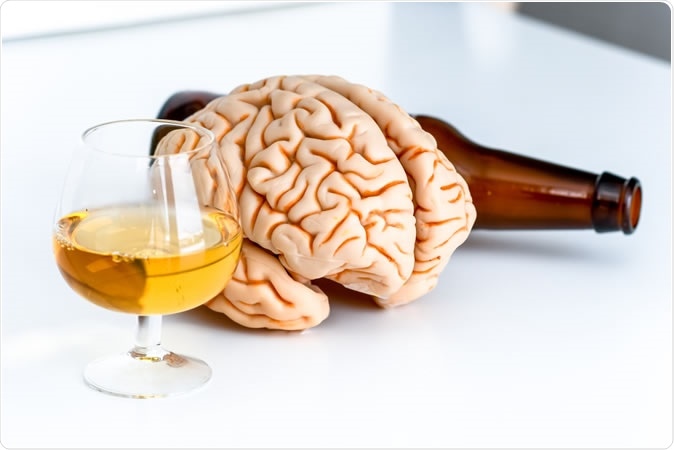Research has shown that excessive alcohol use is associated with reduction in brain volume. Now a new study has shown that brain volume is associated genetically with a predisposition to excessive alcohol consumption.
The results of the study titled, “Convergent evidence for predispositional effects of brain gray matter volume on alcohol consumption,” was published in the latest issue of the journal Biological Psychiatry.

Image Credit: Rozbeh / Shutterstock
This was a “chicken and egg” question for researchers. Did excess alcohol consumption cause shrinkage of the brain or are people with a smaller brain size more prone to consume more alcohol, said researchers. Ryan Bogdan, associate professor of psychological and brain sciences in Arts & Sciences and director of the Brain Lab at Washington University in St. Louis, in a statement said, “Our results suggest that associations between alcohol consumption and reduced brain volume are attributable to shared genetic factors.” He added, “Lower brain volume in specific regions may predispose a person to greater alcohol consumption. The study is impressive because it uses a variety of approaches and data analysis techniques to reach findings that all converge on the same conclusion.” His lab was where the study took place.
There were three independent brain imaging studies from longitudinal and family data that were the basis for this study. There was outcome based study including twin sibling and non-twin sibling studies. Children never been exposed to alcohol and those exposed later in life were followed up and also post-mortem brain studies were performed to arrive at conclusions said the researchers. Data came from three databases including Duke Neurogenetics Study, the Human Connectome Project and the Teen Alcohol Outcomes Study. A total of 2,423 individuals were studied.
Lead author David Baranger, postdoctoral scholar at the University of Pittsburgh, working with Bogdan in his lab said, “Our study provides convergent evidence that there are genetic factors that lead to both lower gray matter volumes and increased alcohol use.” Baranger explained, “These findings don't discount the hypothesis that alcohol abuse may further reduce gray matter volumes, but it does suggest that brain volumes started out lower to begin with. As a result, brain volumes may also serve as useful biological markers for gene variations linked to increased vulnerability for alcohol consumption.” For this study other psychology graduate students and faculty from Washington University School of Medicine in St. Louis, Duke University and the Medical University of South Carolina were also involved.
The three major studies revealed that there is a reduction in the gray matter volume of two regions of the brain namely the dorsolateral prefrontal cortex and the insula. These areas are associated with memory, decision making, cognition, emotions and reward phenomenon. Researchers found that genetically shrinkage of brain could be predicted especially in the insular regions of the brain. These studies spanned from childhood to adulthood of the participants. This shrinkage of the insula was further a predictor of alcohol use in the individual wrote the researchers including factors such as age of first alcohol use and also future alcohol use among the participants.
To confirm the connection between genetics and brain size and alcohol use the researchers also looked at data from twins and non-twin siblings. Twins carry exact same genes while siblings carry similar genes, explained the researchers. Alcohol consumption was compared among the siblings and it was found that the non-twin siblings that consumed more alcohol had lower gray matter volumes. In cases of twins where one of the siblings drank more, both had similar low gray matter volume. This explains that having a low gray matter was a predicting factor of who would be a heavy drinker in future creating a special vulnerability in that individual. Low gray volume thus was not a result of alcohol consumption, the team explained.
Specific genetic regions in the genome were also studied to explore the areas predicting low brain volume and heavy alcohol use. They noted that some of the genes that raised risk of alcohol use were expressed more in the dorsolateral prefrontal cortex of the brain compared to other brain regions. This was taken as additional proof that low gray matter in the frontal cortex was actually genetically medicated and this led to an increased vulnerability to consume more alcohol.
Authors of the study concluded, “Our analyses in three independent samples provides unique convergent evidence that associations between middle/superior frontal gray matter volume and alcohol use are genetically-conferred and predict future use and initiation.” “While this may in turn lead to accelerated volume loss within these and other regions, these findings challenge predominant interpretations that smaller brain volumes tied to alcohol use emerge primarily from the atrophy-inducing effects of alcohol. As larger prospective samples are acquired, it will be interesting to examine the interplay of genetic risk and substance-use on the trajectories of brain development,” they wrote.
Source:
Journal reference:
Convergent evidence for predispositional effects of brain gray matter volume on alcohol consumption Baranger, David AA. et al. Biological Psychiatry, https://www.biologicalpsychiatryjournal.com/article/S0006-3223(19)31678-6/fulltext